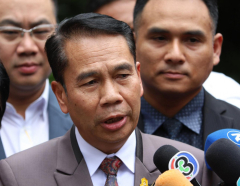Sutin: Shopping for advice
Picking the right person for the defence portfolio can be a tough call as the choice can be crucial to the country’s security and a government’s fate, according to observers.
It wasn’t unexpected then that there was a lot of speculation as to who the likely defence minister would be during the few weeks prior to the cabinet appointees being finalised.
The defence minister post is typically taken by the party which leads government formation, in this case Pheu Thai. In this latest cabinet appointment, it was one of those times when it was the rule, not the exception.
In previous administrations, defence ministers were usually former senior military men, preferably one closely aligned with the prime minister or a powerful figure in the government.
A top military man being entrusted with the defence portfolio became almost a tradition. It was also largely a legacy of the militaristic dominance of Thai politics in days gone by.
However, Pheu Thai is billed as a trailblazer when it comes to picking a defence minister. The Yingluck Shinawatra administration, led by Pheu Thai, broke with tradition when Yingluck made the unprecedented move to concurrently hold the premiership and be the country’s first female defence minister.
A fugitive who fled overseas to escape a court conviction in connection with the graft-riddled handling of her administration’s rice-pledging scheme, Yingluck was the fourth civilian to oversee the Defence Ministry, following three former premiers before her — Chuan Leekpai who became defence minister in September 1997, Samak Sundaravej in February 2008 and Somchai Wongsawat in September 2008.
Yingluck was her government’s third defence minister after Gen Yuthasak Sasiprapha and ACM Sukampol Suwannathat.
Except for Mr Chuan, the Democrat Party patriarch, Samak and Mr Somchai retained ties to what is now the Pheu Thai Party.
Samak was succeeded as prime minister by Mr Somchai, and both men headed administrations led by the People’s Power Party (PPP), which was eventually ordered dissolved by the Constitutional Court for electoral fraud before being reborn as Pheu Thai.
Back in government, Pheu Thai had many wondering and betting on who its choice of defence minister would be and whether it would pick a civilian over a military figure.
It was strongly speculated it would either be Sutin Klungsang, Gen Vit Thephasdin Na Ayutthaya or Gen Natthapon Nakpanich.
Mr Sutin is a Pheu Thai deputy leader, while Gen Vit is a former chief strategist of the Palang Pracharath Party led by former deputy premier Gen Prawit Wongsuwon.
Gen Natthapon formerly served as secretary-general of the National Security Council and maintains close links with former prime minister Gen Prayut Chan-o-cha.
Having been thought of having a shot at the top defence post and with their links to the previous government, both Gen Vit and Gen Natthapon represented power inherited from the Prayut government.
For weeks, rumours and speculation swirled about the list of likely cabinet appointees and intense interest from political watchers was focused on Mr Sutin after his name was put in the frame.
However, for a brief period, Mr Sutin was seen as a possible education minister.
But, he re-emerged as a strong defence minister candidate after a large swathe of Pheu Thai supporters opposed a former army general — who cosied up to the previous, ‘pro-dictator’ government whose military leaders they blame for fatalities in the 2010 crackdown on red-shirt protesters in B
Read More





